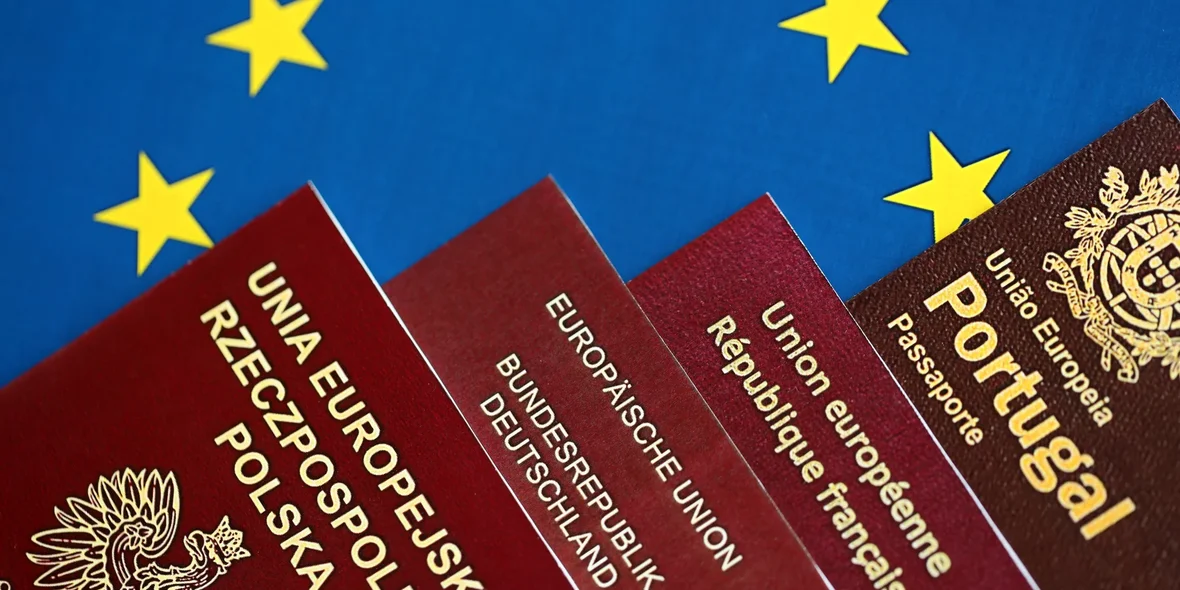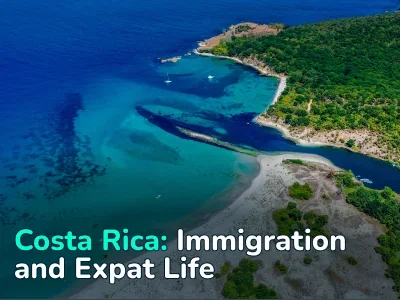
10 Myths About EU Citizenship: the Truth and Lies That Everyone Should Know
The topic of European Union citizenship is surrounded by numerous myths. Various online sources promise to «buy an EU passport,» obtain it through marriage, or acquire it via a simplified procedure, while omitting the fact that such options simply do not exist.
The European Union is not a single state and has neither its own citizenship nor its own passport. Although EU member states follow common principles, they maintain significant differences in their national legislation.
In this article, we will examine the most widespread myths about EU citizenship and see what the reality looks like.
What Is EU Citizenship and What Rights Does It Provide?
EU citizenship does not exist as an independent legal status; it is derived from the citizenship of an EU member state. This means that by obtaining, for example, French or Polish citizenship, a person automatically becomes a citizen of the European Union and receives EU passport benefits as well. Importantly, EU citizenship does not replace national citizenship but complements it. It grants a uniform set of rights for all EU citizens:
- Basic right. Every EU citizen has the right to move and reside freely within the territory of the member states without additional requirements for up to three months. Staying longer than three months requires employment, sufficient financial resources, and health insurance.
- Work and business. EU citizenship rights include permission to work in any EU country without a separate work permit.
- Political rights. An EU citizen residing in another member state has the right to vote and run in municipal elections and elections to the European Parliament under the same conditions as nationals of that state.
- Consular protection. If your home country has no embassy in a third country, you are entitled to assistance from the embassy of any other EU member state.
Myth #1: You Can Buy EU Citizenship for Any Price
The services market is full of offers to «buy an EU passport through investment,» creating the illusion that anyone with enough money can directly obtain European citizenship. In reality, there is no such possibility to «buy EU citizenship.» What exists are separate national programs known as «citizenship by investment in Europe» or golden passports. However, the European Commission has consistently pressured member states to shut them down:
- Cyprus. Citizenship was granted for investments starting from €2 million. The European Commission publicly warned that such programs «undermine the principles of the Union» and pose security risks. In November 2020, the Cypriot government officially closed the scheme.
- Bulgaria. Until 2022, Bulgaria operated an accelerated naturalization program through investments in government bonds or companies of around €500,000—1 million.
- Malta. Since 2014, the Individual Investor Programme (IIP) has allowed citizenship via a €650,000 contribution plus investments. The European Commission launched infringement proceedings, and under pressure, the Maltese government shut down the IIP.
Until 29 April 2025, Malta was the last EU country with such a program (MEIN / NESDI). However, the European Court of Justice ruled that it violated EU law, and Malta stopped accepting new applications. At this point, the path of «citizenship by investment» in the EU is effectively closed. Malta now plans to replace the scheme with a new model of «citizenship by merit.»
Myth #2: Living in an EU Country for a Few Years Is Enough
It is commonly believed that moving to an EU country and living there for several years automatically leads to citizenship. In reality, residence is only one requirement, and by itself it never grants a passport. In most countries, applicants must obtain legal resident status, pass language and integration tests, and maintain a clean criminal record.
Examples from different EU states:
- Spain. Standard requirement — 10 years, reduced to 2 years for nationals of Latin America, Andorra, the Philippines, Portugal, and Sephardic Jews. Requires Spanish language at A2 level + CCSE test on constitution and culture.
- Italy. Minimum 10 years of residence; applicants must prove Italian language knowledge at the B1 level.
- Germany. As of 2024, most applicants can naturalize after 5 years of residence. Requirements: German language at B1 level and successful completion of the integration test.
- France. Standard 5 years, or 2 years for graduates of French universities or military service. Applicants must demonstrate French at the B1 level and pass an «assimilation interview.»
- Portugal. Requires 5 years of residence, but only years under legal residence permits are counted (student visas without transition to residency do not qualify). Requires CIPLE exam (A2) in Portuguese language and culture.
- Austria. Minimum 10 years of legal residence. The state grants citizenship very rarely and only upon full renunciation of previous nationality. Requires German language at B1 level and a civics/history test.
Myth #3: All EU Countries Grant the Same Rights
It seems logical that since there is a common «EU citizenship,» rights should be identical across all member states in employment, social benefits, and taxation. In practice, the basic framework of rights is the same, but their implementation depends heavily on national laws. Examples include:
- Social benefits. In Germany and the Netherlands, EU citizens can only receive social assistance after establishing a «genuine link» with the country. Germany may deny basic benefits to economically inactive EU citizens.
- Right to practice professions. Doctors, lawyers, and teachers must undergo qualification recognition. While EU directives establish a mechanism, procedures vary by state.
- Taxes. The EU has no unified tax policy. Tax residence is determined by national law and local tax rates.
- Voting rights. All EU citizens can vote and stand in municipal elections and European Parliament elections in their country of residence, but national and regional elections remain reserved for citizens of that state.
- Healthcare access. With the European Health Insurance Card (EHIC), EU citizens can access healthcare abroad, but conditions vary: in Spain, basic services are free; in Germany, part of the costs are reimbursed via insurance funds.
Myth #4: Dual Citizenship Is Always Allowed in the EU
Legislation on dual citizenship in the EU is the exclusive competence of the member states. The EU does not regulate this issue in any way. Looking at specific cases: France, Italy, Ireland, Portugal, Belgium, and Sweden all permit multiple citizenship without restrictions.
Germany generally requires applicants to renounce their previous nationality, but makes exceptions for EU and Swiss citizens. The Netherlands also requires renunciation, with exceptions only if the applicant was born in the Netherlands, is married to a Dutch citizen, or if renunciation is objectively impossible. Austria almost always requires giving up prior citizenship, with very rare exceptions granted only by government decision (for example, for exceptional merit). Estonia follows a similar policy: dual citizenship is not recognized, and children born with two passports must choose one upon reaching adulthood.
Myth #5: An EU Passport Lets You Live Anywhere Without Conditions
The right to free movement and residence is indeed guaranteed, but it is not absolute. Member states may expel an EU citizen if they become an «unreasonable burden» on the social welfare system.
Additionally, expulsion is possible for those who threaten public order, security, or public health. Most commonly, entry is denied to individuals with serious criminal convictions or contagious diseases.
Myth #6: Marriage to an EU Citizen Automatically Grants Citizenship
Marriage and EU citizenship are linked, but one does not automatically grant the other. Instead, marriage simplifies the conditions for obtaining a residence permit, which may later lead to naturalization. Each country has its own rules:
- France. A foreign spouse may apply after 3 years of marriage (or 4 if the couple lives abroad). Proof of cohabitation and French language proficiency is required.
- Spain. Citizenship can be obtained after 1 year of marriage and residence in Spain.
- Italy. Application is possible after 2 years of marriage while living in Italy (or 3 years if abroad). The period is halved if the couple has children. An Italian language test at the B1 level is mandatory.
- Germany. A foreign spouse may apply after 3 years of marriage and 2 years of residence in Germany, though the general minimum naturalization period for most applicants remains 5 years.
In all EU countries, spouses must prove genuine cohabitation, stable income and tax compliance, absence of criminal records, and sufficient knowledge of the language and culture of the country.
Myth #7: An EU Passport Exempts You From All Taxes
Taxes depend not on citizenship but on tax residency. In most EU countries, a tax resident is defined as a person who spends more than 183 days a year in the country or has vital interests there (work, family, property).
An EU passport does not grant immunity from taxation. If a person lives and works in an EU country, they become its tax resident and pay taxes there. Any tax benefits that exist are tied to residency regimes, not to citizenship.
Myth #8: All EU Countries Have the Same Naturalization Rules
EU naturalization rules are entirely determined by national laws. The EU only regulates the consequences of citizenship (the common status of an EU citizen) but does not interfere in the procedures themselves. As a result, the requirements and timelines for obtaining citizenship differ significantly from one member state to another.
Myth #9: Children Automatically Get an EU Passport
The EU has no single jus soli («right of the soil») rule. In most countries, a child’s citizenship depends on the parents’ nationality, not on the place of birth. Exceptions exist, but they are limited.
- Germany. A child can obtain German citizenship at birth if at least one parent held permanent residence and had lived in Germany for at least 5 years before the child’s birth.
- France. Birth on French territory does not automatically confer citizenship. However, a child born in France can become French at age 18 if they have lived there for at least 5 years since the age of 11. There is also the double droit du sol rule, where citizenship is granted if one parent was born in France.
- Spain. Citizenship at birth is not automatic if both parents are foreigners. However, a child may qualify after 1 year of residence if the parents are nationals of Latin American countries, Andorra, the Philippines, or Portugal.
- Italy. Citizenship is based on jus sanguinis (descent). A child born in Italy to foreign parents does not automatically acquire citizenship, but may apply later if they have lived there continuously.
- Ireland. Since the 2004 reform, a child acquires Irish citizenship only if at least one parent had a right to Irish citizenship at the time of birth.
Unlike the United States and Canada, which still apply full jus soli, the EU has almost completely rejected it. The main reason is birth tourism, when foreign nationals travel to give birth so that the child automatically gains citizenship. In Europe, this is viewed as circumventing immigration and nationality laws.
Myth #10: EU Citizenship Is a Lifetime Guarantee
EU citizenship does not exist independently from national citizenship. It can be lost under the same conditions as the national citizenship of the member state. If a state revokes its citizenship, EU citizenship status is automatically lost as well.
This most often happens in cases of fraud during naturalization, concealment of facts, or holding dual citizenship without permission. In some countries, such as Austria and the Netherlands, citizenship can also be lost if a person resides abroad for an extended period.
Frequently Asked Questions about EU Citizenship
Can you buy EU citizenship?
EU citizenship is always derived from the nationality of a specific member state. The “golden passport” programs in Cyprus and Bulgaria have been shut down, and Malta — the last EU country offering such a scheme — stopped accepting new applications on 29 April 2025 after a legal dispute with the EU.
Which EU countries allow dual citizenship?
Countries like France, Italy, Ireland, Portugal, Belgium, and Sweden allow dual citizenship without requiring renunciation of the first passport. Others, such as the Netherlands, Austria, and Estonia, generally do not accept it.
How many years does it take to get EU citizenship?
The typical residency period before applying for naturalization ranges from 5 to 10 years, depending on the country. The shortest terms are found in Portugal, France, and Germany, while the longest apply in Italy, Spain, and Austria.
How to get EU citizenship?
An EU passport can only be obtained after acquiring the nationality of one of the member states. While conditions differ by country, the common EU citizenship requirements include:
- Legal residence for the required period.
- Language proficiency (A2 to B1 in most countries).
- Proof of income and tax compliance.
- Clean criminal record.
- Integration (tests on history, constitution, and culture).
Can you obtain citizenship in the EU through marriage?
Marriage does not automatically grant citizenship. It only shortens the required residence period before applying for naturalization.
Author
I write informative articles about real estate, investments, job opportunities, taxes, etc.























